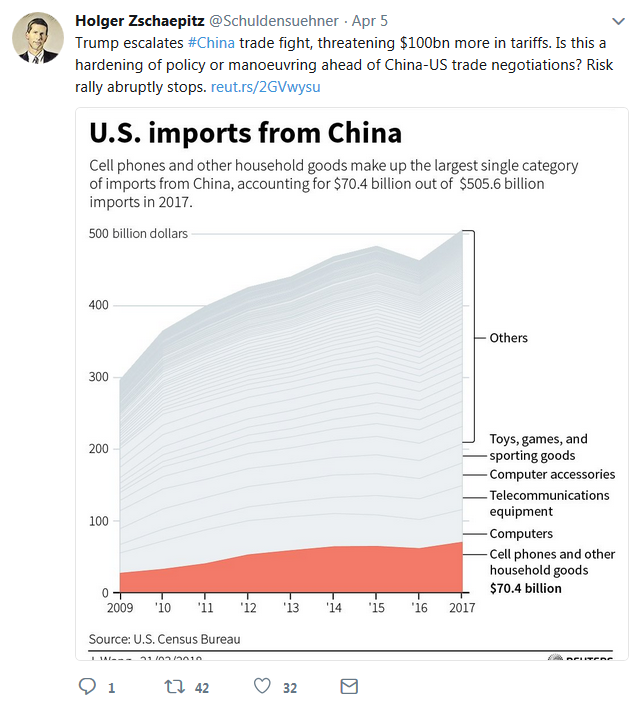Trade Wars: Playing hardball with China
By Colin Twiggs
April 6, 2017 4:00 a.m. EDT (6:00 p.m. AEST)
First, please read the Disclaimer.
Remember North Korea and the imminent nuclear war? With leaders trading insults on Twitter and bragging: "My nuclear button is bigger than yours." It may resemble a WWF arena more than international diplomacy but that is how Donald Trump conducts foreign affairs.
The current Twitter war over trade tarrifs is no different. Threat and counter-threat of wider and deeper trade tariffs are likely to bounce back-and-forth over the next few weeks. Xi Jinping thinks he has the upper hand because he doesn't face criticism from a hostile media at home. Nor does he need to front up to a hostile domestic opposition. They're all safely tucked away in jail. His stock market has already crashed, so there is not too much to worry about on that front either.
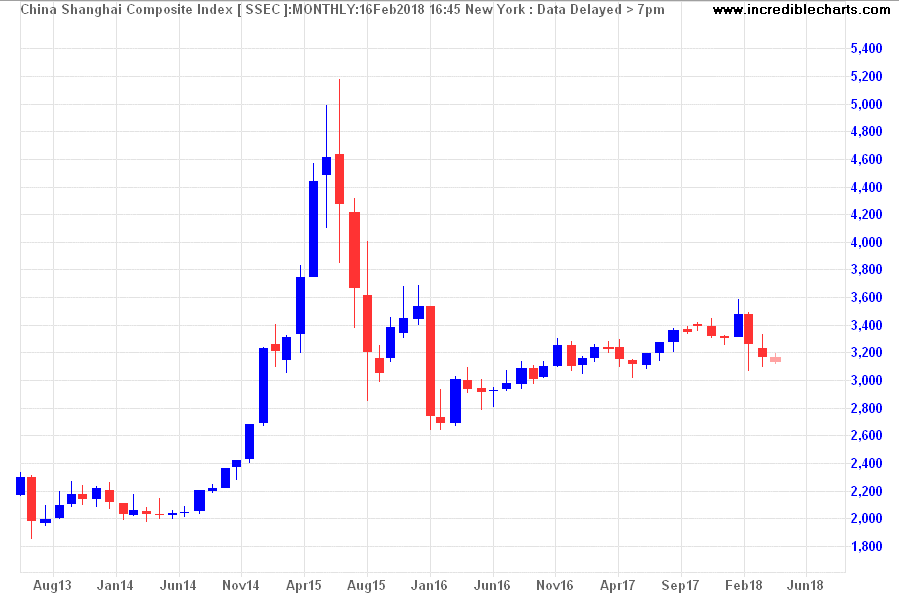
Xi will do his best to undermine Trump's shaky support. Targeting Trump's electoral base with tariffs on soy bean imports (farming states) and steel tubing (Texas) in order to undermine his support. Targeting technology companies like Boeing and Apple, where China is a large slice of their global market, is also likely to elicit strenuous lobbying in Washington. As are well-timed tweets aimed at undermining stock support levels, threatening a major stock market rout.
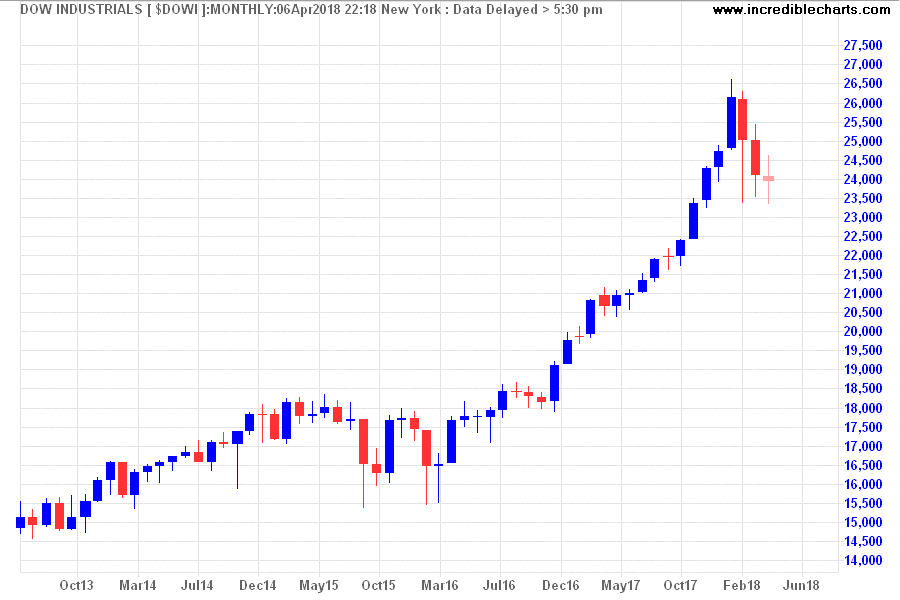
Trump probably recognizes that China can withstand more pain, but figures that he has the capacity to inflict more pain. The US has a large trade deficit with China.
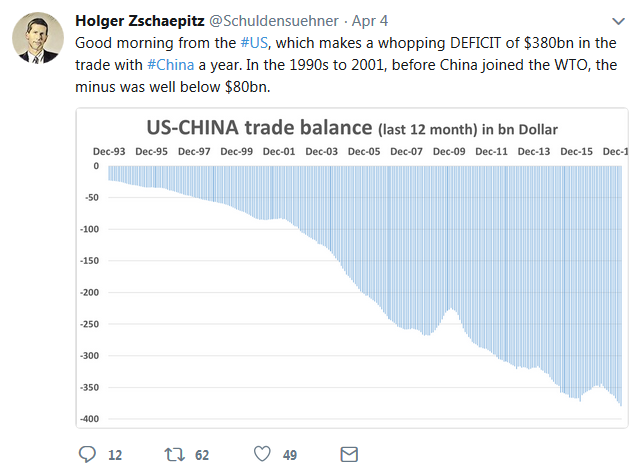
And exports comprise a larger percentage of China's GDP.
In 2010, Paul Krugman wrote:
Some still argue that we must reason gently with China, not confront it. But we've been reasoning with China for years, as its surplus ballooned, and gotten nowhere: on Sunday Wen Jiabao, the Chinese prime minister, declared — absurdly — that his nation's currency is not undervalued. (The Peterson Institute for International Economics estimates that the renminbi is undervalued by between 20 and 40 percent.) And Mr. Wen accused other nations of doing what China actually does, seeking to weaken their currencies "just for the purposes of increasing their own exports."
But if sweet reason won't work, what's the alternative? In 1971 the United States dealt with a similar but much less severe problem of foreign undervaluation by imposing a temporary 10 percent surcharge on imports, which was removed a few months later after Germany, Japan and other nations raised the dollar value of their currencies. At this point, it's hard to see China changing its policies unless faced with the threat of similar action — except that this time the surcharge would have to be much larger, say 25 percent.
I don't propose this turn to policy hardball lightly. But Chinese currency policy is adding materially to the world's economic problems at a time when those problems are already very severe. It's time to take a stand.
Krugman (no surprise) now seems more opposed to trade tariffs but observes:
....I think it's worth noting that even if we are headed for a full-scale trade war, conventional estimates of the costs of such a war don't come anywhere near to 10 percent of GDP, or even 6 percent. In fact, it's one of the dirty little secrets of international economics that standard estimates of the cost of protectionism, while not trivial, aren't usually earthshaking either.
I believe that Krugman's original 2010 argument is still valid and that Trump is right in confronting China. The gap between imports and exports of goods is widening, especially since 2014, not shrinking.
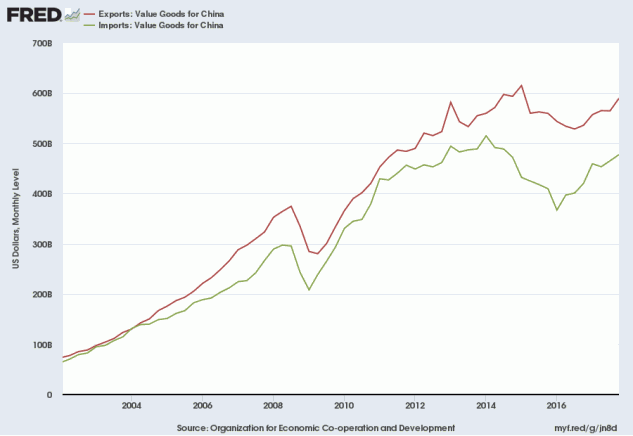
But let's hope that Trump has done his homework. At this stage this is just a Twitter war rather than a trade war, intended to soften up your opponent rather than inflict real damage. But for Trump to succeed he must demonstrate that the US is prepared to endure the pain of a lengthy trade war if needed.
Men naturally despise those who court them, but respect those who do not give way to them.
~ Thucydides (circa 400 BC)
Latest
-
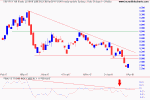
ASX 200
Banks lead the index lower. -
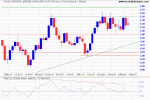
Gold and the Trade War
The Dollar is strengthening despite trade war threats. -
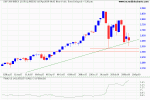
S&P 500 and Volatility
Twiggs Volatility Index remains in the amber zone.
Disclaimer
Colin Twiggs is director of The Patient Investor Pty Ltd, an Authorised Representative (no. 1256439) of MoneySherpa Pty Limited which holds Australian Financial Services Licence No. 451289.
Everything contained in this web site, related newsletters, training videos and training courses (collectively referred to as the "Material") has been written for the purpose of teaching analysis, trading and investment techniques. The Material neither purports to be, nor is it intended to be, advice to trade or to invest in any financial instrument, or class of financial instruments, or to use any particular methods of trading or investing.
Advice in the Material is provided for the general information of readers and viewers (collectively referred to as "Readers") and does not have regard to any particular person's investment objectives, financial situation or needs. Accordingly, no Reader should act on the basis of any information in the Material without properly considering its applicability to their financial circumstances. If not properly qualified to do this for themselves, Readers should seek professional advice.
Investing and trading involves risk of loss. Past results are not necessarily indicative of future results.
The decision to invest or trade is for the Reader alone. We expressly disclaim all and any liability to any person, with respect of anything, and of the consequences of anything, done or omitted to be done by any such person in reliance upon the whole or any part of the Material.

Author: Colin Twiggs is a former investment banker with almost 40 years of experience in financial markets. He co-founded Incredible Charts and writes the popular Trading Diary and Patient Investor newsletters.
Using a top-down approach, Colin identifies key macro trends in the global economy before evaluating selected opportunities using a combination of fundamental and technical analysis.
Focusing on interest rates and financial market liquidity as primary drivers of the economic cycle, he warned of the 2008/2009 and 2020 bear markets well ahead of actual events.
He founded PVT Capital (AFSL No. 546090) in May 2023, which offers investment strategy and advice to wholesale clients.

